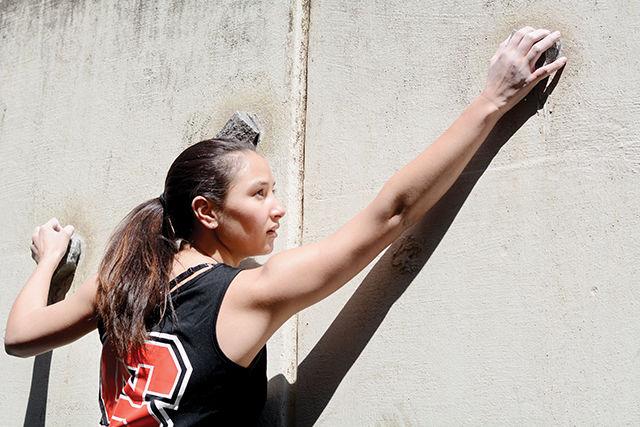A group of NC State students are headed to the Dixie Rock climbing competition this weekend, but without ropes and harnesses. Instead, they will rely on their strength, skills and determination to make it to the top.
Students founded The Competitive Rock Climbing Club, or CRCC, in 2012, and now they are scaling to new heights in terms of more competitions and awards.
Although the organization started without much competing or training, this year has been marked as a time of change and achievements. In the past, the students in it said they put little emphasis on the actual training, which resulted in the group disbanding. However, in the fall of 2013, Josh Clark, a senior studying computer engineering and president and coach of the CRCC, gained inspiration to restart the club.
“Starting in the fall, I took the helm, and we started working with what we had,” Clark said. “It took a little while, but we’ve started to figure out what really works well for us, and the results speak for themselves. We’ve earned 19 trophies in the last two years, and we’re aiming for one or two more at Dixie Rock this weekend.”
This weekend, NC State CRCC will compete in the Dixie Rock competition at the Chapel Hill Community Center. The competition is unique for the climbers because the competition includes a few unusual factors.
“This is a really fun competition and very family-oriented,” said Kate Rafferty, a senior studying fashion and textile management and Dixie Rock volunteer. “It’s really inclusive for all ages and abilities. This year the theme is team spirit, so that’s another reason why we wanted to get NC State’s team involved, so they can compete against other schools. Duke’s team and Chapel Hill’s team is going to be there, so it’s another way to be competitive.”
Furthermore, Clark explained this is unlike all the other competitions in which CRCC participates because Dixie Rock will not have bouldering competitions.
Bouldering is where climbers do not need ropes or harnesses because the climbs are shorter, and they have a selection of at least 10 different climbs to try over several hours. At Dixie Rock, however, they will have six longer routes to climb with only one try at each of them, and they will wear ropes and harnesses.
“Dixie Rock is also the first competition we’ve been to that isn’t focused toward college-aged climbers,” Clark said. “We’ll be competing against little kids who compete nationally and older climbers who have been practicing for decades.”
The competitive rock-climbing season begins in January and finishes at the end of the semester. During the season, the CRCC practices twice a week at Triangle Rock Club and competes in several competitions, traveling as far as Knoxville, Tennessee. During the off-season, it focuses on training as well as attending competitions.
“Our main focus is training for competition,” Clark said. “Since we introduce so many people to climbing, we also try to give our members an introduction to all aspects of the sport. So, we try to climb outside at least once a semester.”
During these two active years, the club has grown in membership. There are now 14 registered members, and according to Clark, a year ago, the club would have been lucky to have two people attend meetings. In addition, levels of experience vary.
“Very few people have joined the club with a lot of climbing experience,” Clark said. “For many, it’s their first time ever trying it. In fact, we’ve had several members come climbing for the first time back in August, and they’re winning trophies in competitions now.”
Beyond the excitement of climbing and the determination to exceed goals, Clark and Rafferty both agree that the community aspect is the best part. They said that although rock climbing is an individual sport, it’s also about encouraging and motivating other climbers.
“The climbing community as a whole is incredibly supportive and collaborative,” Clark said. “Our club, because we’ve spent so much time climbing together, is even more supportive of each other. In addition, climbers have to be extremely safety-conscious, so it’s no exaggeration to say that we trust each other with our lives every time we climb.”
Clark and Rafferty both said that climbing is a sport that is not only physical, but also mental. According to Clark, the climber must look at the selection of holds and features on a wall and figure out how to interpret their hold type, position and rotation to move through them.
“Climbing is really empowering and pushes you to explore your boundaries, both mind and body,” Rafferty said. “In this sense, you have to engage your body and mind to maximize your abilities and achieve your goals. Climbing is hard and requires training and dedication to become proficient but the supportive community and overall self-worth I, and others, have gained through climbing is totally worth it.”








